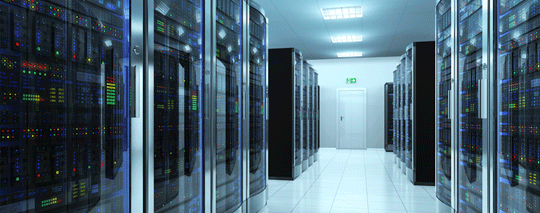Still curious about the cloud & Cloud ERP Software ?
First of all, the cloud isn’t as transient as it sounds. A strong wind won’t move it along and the sun won’t dissolve it (unless there is a severe shift in the earth’s axis). You can touch it, you can feel and smell it…. and it looks something like this…

The cloud is made up of high powered servers, electricity, cooling, hard drives, software & services plus lots and lots of fibre & cables linking it back to your phone or PC over the internet. Yes, the cloud is a whole bunch of data centres.
While these data centres are owned and controlled by large companies like Microsoft (Azure), Amazon (AWS), Google (Google Cloud), IBM, Rackspace etc. you’re probably more familiar with the services leveraging this backend like Dropbox, iCloud, Gmail, Office365; that’s how they present it to us consumers.
Me, I love the cloud. It makes so much sense – email, photos, music, configuration backup etc. I do keep local backups but Microsoft’s OneDrive is awesome as is Google Photos, Spotify etc. A lot of these services are free of charge (in that I don’t have to give money to use them) – but there’s always some sort of cost – they have my personal data but that’s a trade-off I’m willing to make. I pay for Spotify in case Taylor Swift is reading….
Private Cloud & Public Cloud
For business to use the cloud effectively, there is always a cost. Running the cloud is not cheap and these companies are in it to make a profit. So usually (whether we know it or not), we are being offered or are already using either private cloud or public cloud…. But what is the difference?
Put simply, a private cloud is when you rent a section of the data centre. Usually it’s a small server or group of servers plugged into a rack that is accessible solely by you or your IT person and of course the guys and gals that run the data centre. It’s yours to rent for as long as you want and to do with it what you want. You’re paying for the equipment and the communication infrastructure to access it, but what it really all boils down to is how much electricity you or your server is using. As we all love analogies, it’s like renting an apartment – you pay for it as long as you’re using it but it has your name over the door.
That analogy leads nicely to public cloud. If private cloud is like renting an apartment for 5 years, public cloud is similar to a timeshared apartment. Your data and processing power lives in a big apartment block shared with loads of other people (or companies) and you get to use the amenities when time allows. The techies like to call this “waiting for cycles”. It’s less expensive, less secure and sometimes an attractive taster for cloud usage.
So should you use the cloud? And what about cloud ERP Software?
If you’re like most businesses, you probably have a server sitting in the corner somewhere. This server houses all your mission critical business data including ERP & accounting systems and of course probably thousands of documents and spreadsheets.
Is this any safer than your data being stored in a data centre whose sole job is to keep your data secure and available? Probably not. I personally don’t really buy into the argument that the cloud is not safe. It is pretty safe and private cloud is likely to be just as safe as your server in a basement beside a window.
The real question you must ask is “What problem do I have that the cloud is solving?” Computers and software exist to make our lives easier or better; they exist to solve problems. If you have a problem with your server in the basement and you’d prefer to pay extra for space in a data centre then cloud is for you. If you don’t have a problem with a server on premises and in fact absolutely MUST have a server in the corner for legacy application reasons, then the cloud isn’t for you.
My personal belief is that a business’s investment in technology should always be to either solve a problem or introduce efficiencies. When our customers look to us for advice we consider all elements of their business and the benefits cloud or on premise brings. Interestingly, Intact users in Australia and New Zealand are adopting cloud much quicker than our customers in Ireland & UK but it seems this is down to more confidence and lower cost of their communication (internet) services.
If you have any questions on the cloud or cloud ERP software , please feel free to comment below or contact us at +353 (0)42 9331742 (Ireland) or +44 (0)1442 878879 (UK).
If you are currently reviewing ERP systems with a view to upgrading from an old or legacy system, you might find our FAQs blogs useful
Worth A Read – ERP – A Total Business Management System






